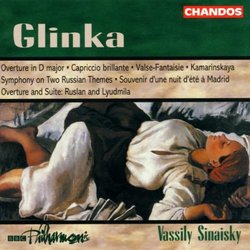| All Artists: Mikhail Glinka, Vassily Sinaisky, BBC Philharmonic Orchestra Title: Glinka: Orchestral Works Members Wishing: 1 Total Copies: 0 Label: Chandos Release Date: 1/23/2001 Genre: Classical Styles: Opera & Classical Vocal, Symphonies Number of Discs: 1 SwapaCD Credits: 1 UPC: 095115986127 |
Search - Mikhail Glinka, Vassily Sinaisky, BBC Philharmonic Orchestra :: Glinka: Orchestral Works
 | Mikhail Glinka, Vassily Sinaisky, BBC Philharmonic Orchestra Glinka: Orchestral Works Genre: Classical
|
Larger Image |
CD Details |
CD ReviewsNice assortment of Glinka's orchestral works. David A. Hollingsworth | Washington, DC USA | 02/04/2001 (4 out of 5 stars) "This is the second CD containing Glinka's works for orchestra that was released within the past year. The first one featured Loris Tjeknavorin & the Armenian Philharmonic under ASV & was well reviewed, especially by Grammophone Magazine. This Chandos CD is most enterprising however, not using the bulk of the CD for extracts from The Life for the Tsar and Ruslan & Ludmilla, Glinka's two historically important operas. Instead, what we have is the Overture in D Major & the Symphony on Two Russian Themes along w/ other works usually recorded under one CD. Of 76 minutes total for this CD, only 23 minutes are devoted to the Overture & extracts of Ruslan & Ludmila (including the Dance of Act III, & Chernomor's March of Act IV), truly outside the norm when presenting Glinka's orchestral works on a single CD.The Symphony (in one movement, six contrasting tempi) is a particular attraction, with a serious, melancholic Largo opening followed by a noble andante section. The Allegro section is jovial, however, with the following passages culminating into something of a exburance in the con spirito mode. The booklet essay, surprisingly, failed to mention that the Symphony was one of two symphonies Glinka began but never finished. It took until 1948 for the symphonies to be published in their final form, thanks to Vissarion Shebalin, who edited & orchestrated them. Shebalin's edition & orchestration were ingenious and realistic, not damaging the authenticity of Glinka's noble ideas, while keeping the essence of his writing fully intact. The other works provide Glinka's use of folkmusic in diverse ways (except the well-written, passionate Valse-Fantasie). The Capriccio brillante on the Jota Aragonesa & the Souvenir d'une nuit d'ete Madrid (Memory of a Summer Night in Madrid) are excellent surveys of Spanish music Glinka absorbed and admired during his visits to Spain, while the Overture leans on the spirit of Rossini (& Glinka travelled to Italy quite extensively). The Kamarinskaya, Fantasy on Two Russian Folksongs, is appealing in his use of folklore music & rightly serve as among the testaments in the way folkmusic can be used in works especially in large scale form. Russian composers after Glinka, especially Dargomyzhsky, never continued their composing careers without learning & in some respects, enhancing Glinka's technique in the use of folkmusic.The BBC Philharmonic under Vassily Sinaisky gave the works warm and sensitive renditions. Somehow, however, do I yearn for a greater sense of sonority & involvement especially in the Symphony. Svetlanov's recording of the Symphony & other Glinka's works (Melodiya/Chant du Monde-nla) has that Russian sonority and sparkle that's rewarding even on merits alone while Fedoseyev & the Tchaikovsky Russian Radio Symphony (Harmonia Mundi), though not blessed with the Chandos opulent sound, managed to capture the slavic layers, the Russian soul, behind these works. Recommendable, though the currently available recordings featuring Fedoseyev & Tjeknavorian, though not as enterprising, are the more enjoyable." A Desert Island Disc: Wonderful! Mr. Allan K. Steel | Sydney, AUS | 05/19/2006 (5 out of 5 stars) "Absolutely wonderful, by neglected by significant 19th C Russian composer.
Review below gives detailed analysis of the pieces. The sound recording and playing is superb. The famous Jota is recorded with lovely precision: the harp is very clear, as needed. Everything else is wonderful too." |

 Track Listings (9) - Disc #1
Track Listings (9) - Disc #1